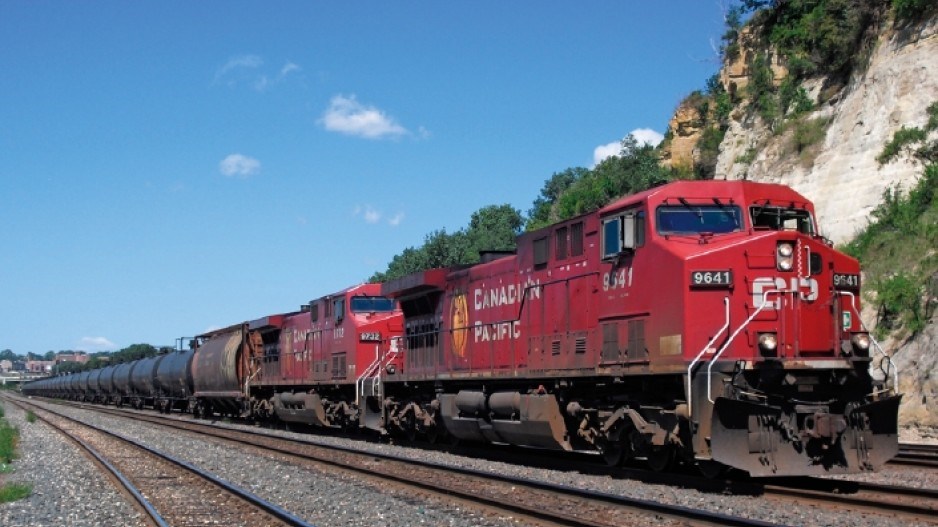Growing interest in pipeline alternative, but railways, associations downplay its potential
While Enbridge Inc.(TSX:ENB) faces a new surge of public and political opposition to its proposed $5.5 billion Northern Gateway pipeline, B.C. is still far from seeing a clear business case for an above ground pipeline alternative: moving Alberta oil by rail to B.C.'s West Coast.
While Canadian National Railway Co. (TSX:CNR) (CN) and Canadian Pacific Railway Ltd.(TSX:CP) (CP) are moving some Prairie oil by rail to Eastern Canada and parts of the U.S., neither is looking at oil-by-rail opportunities in B.C.
“At this time, the potential for moving crude by rail to the West Coast is really in a development stage,” CP spokesman
Ed Greenberg told Business in Vancouver, noting that the company's only West Coast port rail destination is Vancouver.
“If the energy industry determined it required another way of moving oil to the West Coast, it would be something we would look at, but it's not something we're actively involved in.”
CN rail lines serve the ports of Prince Rupert, Kitimat and Vancouver.
However, while company spokesman
Mark Hallman said the company started testing oil-by-rail movements in 2010 and expects its North American oil-by-rail volumes to jump sixfold this year to 30,000 carloads, he declined to comment about potential oil-by-rail business to the West Coast.
“We're not speculating about that subject,” he said.
Travis Davies, manager of media and issues for the
Canadian Association of Petroleum Producers, said only “a small chunk” of Albertan oil producers are looking at the idea of moving oil by rail to B.C. But he said interest is growing.
“There is an obvious demand ... whether it's from refiners on the U.S. west coast or whether it's from Asian countries as well.”
However, Calgary-based Cenovus Energy Inc. (TSX:CVE), which ships to the West Coast via Kinder Morgan's Trans Mountain pipeline, said pipelines continue to make the best business sense for the company.
“Pipelines are still the most economic way to transport oil, although rail is useful in areas with limited pipeline access and when the rail option is convenient,” said
Rhona DelFrari, Cenovus' director of media relations.
DelFrari added that the company remains focused on pipelines. “We have adequate pipeline capacity at this time to get our oil to market, including firm service on Kinder Morgan's Trans Mountain pipeline to the West Coast.
“As a result, sending our oilsands production to market using rail isn't a priority.”
Philippe Reicher, vice-president of external relations for the Canadian
Energy Pipeline Association, said the magnitude of rail capacity needed to theoretically replace the capacity of the Northern Gateway or Kinder Morgan Canada's proposed expansion project is substantial.
“If both projects were to move ahead, it would mean almost one million bpd [barrels per day] of additional capacity to the West Coast, [the equivalent of] over 1,000 rail cars per day.”
A new Canadian Energy Research Institute study raises the issue of shipping Alberta oil by rail to the West Coast, but it also notes that capacity is a key limitation.
“While rail is emerging as a serious option to pipeline transportation, the former is subject at the present time to limited availability of rolling stock and storage capacity,” the report states.
Vancouver-based G Seven Generations Ltd. (G7G) is the most vocal advocate of moving oil by rail across B.C.
The four-person company is proposing a $12 billion twin-tracked rail line to transport oil from Alberta's oilsands to the marine oil terminal at Valdez, Alaska.
Company director
Matt Vickers said the company has lined up prospective private funders for project construction and is working to secure government funding for a multimillion-dollar feasibility study.
Vickers said G7G believes it would be able to move as much oil as the combined volumes of the Northern Gateway and Kinder Morgan's expansion, although he noted that he is waiting for the feasibility study to confirm that.
And while Davies and DelFrari said moving oil via rail is more expensive than by pipeline, Vickers contends that his railway would offer “comparable” prices to pipelines.
Has G7G attracted interest from Albertan oil companies?
“We have purposefully not gone to the Suncors and Shells of the world until we have everything in place,” Vickers said.




